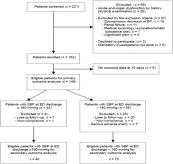Effect of predischarge blood pressure on follow-up outcomes in patients with severe hypertension in the ED☆
Affiliations
- Emergency Medicine Unit, Outpatient Department, King Chulalongkorn, Memorial Hospital, the Thai Red Cross Society, 1873, Rama 4 Rd, Patumwan, Patumwan, Bangkok 10330, Thailand
Affiliations
- Emergency Medicine Unit, Outpatient Department, King Chulalongkorn, Memorial Hospital, the Thai Red Cross Society, 1873, Rama 4 Rd, Patumwan, Patumwan, Bangkok 10330, Thailand
- Emergency Medicine Unit, Department of Medicine, Faculty of Medicine, Chulalongkorn University and King Chulalongkorn Memorial Hospital, the Thai Red Cross Society, 1873, Rama 4 Rd, Patumwan, Patumwan, Bangkok 10330, Thailand
Correspondence
- Corresponding author. Tel./fax: +66 2 256 4553.

Affiliations
- Emergency Medicine Unit, Outpatient Department, King Chulalongkorn, Memorial Hospital, the Thai Red Cross Society, 1873, Rama 4 Rd, Patumwan, Patumwan, Bangkok 10330, Thailand
- Emergency Medicine Unit, Department of Medicine, Faculty of Medicine, Chulalongkorn University and King Chulalongkorn Memorial Hospital, the Thai Red Cross Society, 1873, Rama 4 Rd, Patumwan, Patumwan, Bangkok 10330, Thailand
Correspondence
- Corresponding author. Tel./fax: +66 2 256 4553.
Affiliations
- Emergency Medicine Unit, Outpatient Department, King Chulalongkorn, Memorial Hospital, the Thai Red Cross Society, 1873, Rama 4 Rd, Patumwan, Patumwan, Bangkok 10330, Thailand
Affiliations
- Emergency Medicine Unit, Outpatient Department, King Chulalongkorn, Memorial Hospital, the Thai Red Cross Society, 1873, Rama 4 Rd, Patumwan, Patumwan, Bangkok 10330, Thailand
Affiliations
- Emergency Medicine Unit, Outpatient Department, King Chulalongkorn, Memorial Hospital, the Thai Red Cross Society, 1873, Rama 4 Rd, Patumwan, Patumwan, Bangkok 10330, Thailand
Affiliations
- Emergency Medicine Unit, Outpatient Department, King Chulalongkorn, Memorial Hospital, the Thai Red Cross Society, 1873, Rama 4 Rd, Patumwan, Patumwan, Bangkok 10330, Thailand
 Article Info
Article Info
To view the full text, please login as a subscribed user or purchase a subscription. Click here to view the full text on ScienceDirect.

Fig. 1
Flowchart of the patient cohort (*see description of the clinical history and progression of this patient in the “Results” section).
Fig. 2
The comparisons of mean SBP between the groups based on different time points of evaluation (*using independent t test; **using paired t test; numbers with filled or empty dots indicate the outliers of BP; error bars denote ±2 SD).
Fig. 3
The comparisons of mean DBP between the groups based on different time points of evaluation (*using independent t test; **using paired t test; numbers with filled or empty dots indicate the outliers of BP; error bars denote ±2 SD).
Abstract
Background
Although emergency department (ED) patients with asymptomatic severe hypertension (ASH) generally have no serious short-term hypertension-related adverse events, it is unclear whether persistently high discharge blood pressure (BP) affects the outcome due to the dynamic nature of BP.
Objectives
This study aims to investigate the effect of predischarge BP on short-term follow-up results for ED patients with ASH.
Methods
The prospective observational study was performed in the ED of a tertiary care hospital during a 3-month period. Adult patients who had systolic BP ≥180 mm Hg and diastolic BP ≥100 mm Hg without acute end-organ damage were enrolled and treated at the emergency physicians' discretion. Discharge BP was precategorized into severely high and moderately high groups. We compared the groups using direct telephone contact and medical record reviews of follow-up BP within 1 week and identified their related adverse events.
Results
One hundred and forty-six eligible cases were identified in this study; 1 patient (0.7%) had a serious hypertension-related adverse event. One hundred and thirteen patients had follow-up BP information available.
There was no difference in mean systolic BP and diastolic BP at follow-up between patients who were discharged from the ED with severely high vs moderately high BP.
Conclusion
Predischarge BP value is not associated with immediate serious adverse events and does not affect short-term BP control in ED patients with ASH. Further study on the need to lower BP during the ED stay and on antihypertensive prescriptions for these patients is required.
To access this article, please choose from the options below
Purchase access to this article
Claim Access
If you are a current subscriber with Society Membership or an Account Number, claim your access now.
Subscribe to this title
Purchase a subscription to gain access to this and all other articles in this journal.
Institutional Access
Visit ScienceDirect to see if you have access via your institution.
☆Conflict of interest declaration: This study was funded by the Faculty of Medicine, Chulalongkorn University. The authors had no conflict of interest to declare.
Related Articles
Searching for related articles..



